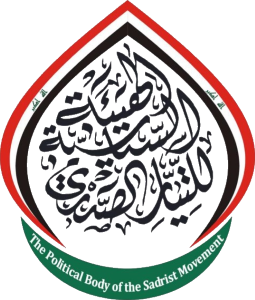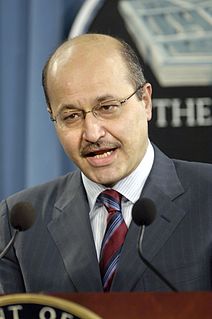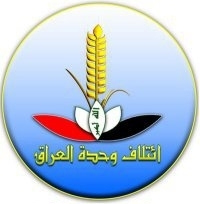| |||||||||||||||||||||||||||||||||||||||||||||||
All 28 seats for the Saladin Governorate council | |||||||||||||||||||||||||||||||||||||||||||||||
|---|---|---|---|---|---|---|---|---|---|---|---|---|---|---|---|---|---|---|---|---|---|---|---|---|---|---|---|---|---|---|---|---|---|---|---|---|---|---|---|---|---|---|---|---|---|---|---|
| |||||||||||||||||||||||||||||||||||||||||||||||
| |||||||||||||||||||||||||||||||||||||||||||||||
The Saladin governorate election of 2009, was held on 31 January 2009 alongside elections for all other governorates outside Iraqi Kurdistan and Kirkuk Governorate.
| |||||||||||||||||||||||||||||||||||||||||||||||
All 28 seats for the Saladin Governorate council | |||||||||||||||||||||||||||||||||||||||||||||||
|---|---|---|---|---|---|---|---|---|---|---|---|---|---|---|---|---|---|---|---|---|---|---|---|---|---|---|---|---|---|---|---|---|---|---|---|---|---|---|---|---|---|---|---|---|---|---|---|
| |||||||||||||||||||||||||||||||||||||||||||||||
| |||||||||||||||||||||||||||||||||||||||||||||||
The Saladin governorate election of 2009, was held on 31 January 2009 alongside elections for all other governorates outside Iraqi Kurdistan and Kirkuk Governorate.
The governor of Saladin, Hamad Hamood al-Qaysi, stood for the Iraqi National List of former Prime Minister Ayad Allawi. The INL also recruited local tribal leaders. The INL were successful in the elections because they had consistently opposed the de-Baathification policies of the Iraqi government, which had caused significant unemployment in the province. [1]
The Reconciliation and Liberation Bloc's main slogan was "Get Out, Get Out Occupier". [1]
Immediately after the election, the Iraqi National List and the Iraqi National Dialogue Front claimed victory in Saladin. [2]
In March, the INDF said they would form an alliance with the State of Law Coalition. [3]
| Coalition | Allied national parties | Seats (2005) | Seats (2009) | Change | Votes | |
|---|---|---|---|---|---|---|
| Salahuddin Accordance Front | Iraqi Accord Front | – | 5 | 57,264 | ||
| Iraqi National Accord | INL | 3 | 5 | 56,853 | ||
| National Iraqi Gathering | 3 | 3 | – | 35,482 | ||
| Iraqi National Dialogue Front | – | 3 | 35,131 | |||
| Iraqi Scholars and Intellectuals Group | – | 2 | 23,772 | |||
| Iraqi Turkmen Front | ITF | 5 | 2 | 19,013 | ||
| Reconciliation and Liberation Bloc | 6 | 2 | 18,743 | |||
| Salahuddin National Front | – | 2 | 18,079 | |||
| List of the Unified Democratic Coalition in Salah al-Din Governorate Brotherly and Co-existence Coalition | PUK, KDP | 8 | 2 | 17,651 | ||
| State of Law Coalition | Islamic Dawa Party | 3 | 2 | 14,422 | ||
| Coalition for Iraqi National Unity | 5 | – | ||||
| Unified List | 4 | – | ||||
| Gathering of Independents in Salah al-Din | 2 | – | ||||
| National Al-Risaliya List | Sadr | 2 | – | |||
| Total | 41 | 28 | 403,764 | |||
| Sources: this article - [4] | ||||||
The politics of Iraq take place in a framework of a federal parliamentary representative democratic republic. It is a multi-party system whereby the executive power is exercised by the Prime Minister of the Council of Ministers as the head of government, as well as the President of Iraq, and legislative power is vested in the Council of Representatives.

The Islamic Supreme Council of Iraq is an Iraqi Shia Islamist Iraqi political party. It was established in Iran in 1982 by Mohammed Baqir al-Hakim and changed its name to the current Islamic Supreme Council of Iraq in 2007. Its political support comes from Iraq's Shia Muslim community.

Parliamentary elections were held in Iraq on 30 January 2005 to elect the new National Assembly, alongside governorate elections and a parliamentary election in Kurdistan Region. The 275-member legislature had been created under the Transitional Law during the international occupation. The newly elected body was given a mandate to write a new constitution and exercise legislative functions until the new constitution came into effect. The elections also led to the formation of the Iraqi Transitional Government.

The Iraqi Turkmen Front, also abbreviated as ITF, is a political movement representing the Iraqi Turkmen people. It was founded on April 5, 1995 as a coalition of several Turkmen parties operating within the framework of Iraq's unity. The party aims for the Turkmen community to have greater political involvement, increased recognition and more rights.

Governorate council elections were held in Iraq on 30 January 2005, the same day as the elections for the transitional Iraqi National Assembly. Each province has a 41-member council, except for Baghdad, whose council has 51 members.
The first government of Iraq led by Prime Minister Nouri al-Maliki took office on May 20, 2006 following approval by the members of the Iraqi National Assembly. This followed the general election in December 2005. The government succeeded the Iraqi Transitional Government which had continued in office in a caretaker capacity until the new government was formed and confirmed.

The Sadrist Movement is an Iraqi Islamic national movement led by Muqtada al-Sadr. The movement draws wide support from across Iraqi society and especially from the Shi'a poor in the country. The most important person in setting the goals and the philosophy of the movement was Grand Ayatollah Mohammad Mohammad Sadeq al-Sadr. A prominent preceding influence had also been Muhammad Baqir al-Sadr. The movement is religious and populist. Its goal is a society ordered by a combination of religious laws and tribal customs.

Governorate or provincial elections were held in Iraq on 31 January 2009, to replace the local councils in fourteen of the eighteen governorates of Iraq that were elected in the 2005 Iraqi governorate elections. 14,431 candidates, including 3,912 women, contested 440 seats. The candidates came from over 400 parties, 75% of which were newly formed.

Parliamentary elections were held in Iraq on 7 March 2010. The elections decided the 325 members of the Council of Representatives who would elect the prime minister and president. The elections resulted in a partial victory for the Iraqi National Movement, led by former Interim Prime Minister Ayad Allawi, which won 91 seats, making it the largest alliance in the Council. The State of Law Coalition, led by incumbent Prime Minister Nouri Al-Maliki, was the second largest grouping with 89 seats.
The Al Anbar Governorate election of 2009 was held on 31 January 2009 alongside elections for all other governorates outside Iraqi Kurdistan and Kirkuk.
The Baghdad governorate election of 2009 was held on 31 January 2009 alongside elections for all other governorates outside Iraqi Kurdistan and Kirkuk.

The Kurdistan Region parliamentary elections of 2009 took place on 25 July 2009. A total of 2.5 million citizens of Kurdistan Region were eligible to vote for the parliamentary and presidential elections. People currently living outside Kurdistan Region were not allowed to vote. The elections followed the 2005 Kurdistan Region parliamentary election. The parliamentary elections coincided with the direct election of the President of Kurdistan. Unlike the parliamentary elections in 2005, the president of Kurdistan was to be chosen directly through popular votes. A referendum to approve the constitution of Kurdistan Region originally planned for the same day was put back to 1 August.
The Tribes of Iraq Coalition also known as the Anbar Salvation Council is an Iraqi political coalition formed to contest the 2009 Al Anbar governorate election which won 2 out of 29 seats. The party was one of several formed out of the Awakening movements - Sunni tribal militias armed and financed by the United States Army to fight al-Qaeda in Iraq. The coalition was led by Sheikh Hamid al-Hais. In an interview with the Washington Post prior to the election, Hais said he would kill all the Iraqi Islamic Party's candidates if anything happened to any of his candidates.

The Iraqi National Movement (INM), more commonly known as the al-Iraqiya List, was an Iraqi political coalition formed to contest the 2010 parliamentary election by Iraqi Vice President Tariq al-Hashimi's Renewal List, the Iraqi National Accord led by former Prime Minister Iyad Allawi and the Iraqi National Dialogue Front led by Saleh al-Mutlaq. The party included both Shi'a leaders and Sunni leaders and claimed to be secular and non-sectarian.
The Intellectuals and Tribes Alliance for Development or Coalition of Intellectuals and Tribes was an Iraqi political list which stood in the 2009 Al Anbar governorate election. The list was created by the then ruling Iraqi Islamic Party because their popularity had severely decreased. They formed an alliance together with the Coalition of Intellectuals and Tribes together with uniting the Islamic Party, the gathering of Anbar’s Tribal Leaders and Intellectuals, Iraq’s People’s Conference and the Independent Tribal National Gathering. The list won 15.9% of the vote and 6 out of 29 seats.

The Unity Alliance of Iraq commonly known as Iraq's Unity, Iraqi Unity or Wassat is an Iraqi political coalition formed to contest the 2010 Iraqi parliamentary election. The coalition was formed by Sheikh Ahmed Abu Risha, the head of the Awakening movement, a Sunni tribal militia which was successful in significantly reducing the insurgency in al-Anbar Governorate and was then reformed into a political party, the Iraq Awakening and Independents National Alliance, which won the most seats in the 2009 Al Anbar governorate election. The Awakening Alliance joined forces with Iraq's Shi'a interior minister Jawad al-Bolani and his secular Iraqi Constitutional Party and Ahmed Abdul Ghafour al-Samarrai, chief of Sunni Endowment Office. The list is led by Jawad al-Bolani.
List of the Martyr al-Mehraab and the Independent Forces,, commonly known as the al-Mehraab Martyr List was a Shi'a Islamist, Iraqi political coalition formed for the 2009 Iraqi governorate elections by the Islamic Supreme Council of Iraq.

The Uniters for Reform Coalition is a Sunni political coalition in Iraq.

Ahmed Abdullah Abid Khalaf al-Jubouri is an Iraqi politician from Salah ad-Din governorate, and a prominent figure in the Baiji area. He was the Minister of State for Provincial Affairs from 2014 to 2015 and the governor of Salah ad-Din governorate from 2013 to 2014.

Parliamentary elections were held in Iraq on 12 May 2018. The elections decided the 329 members of the Council of Representatives, the country's unicameral legislature, who in turn will elect the Iraqi President and Prime Minister. The Iraqi parliament ordered a manual recount of the results on 6 June 2018. On 10 June 2018, a storage site in Baghdad housing roughly half of the ballots from the May parliamentary election caught fire.